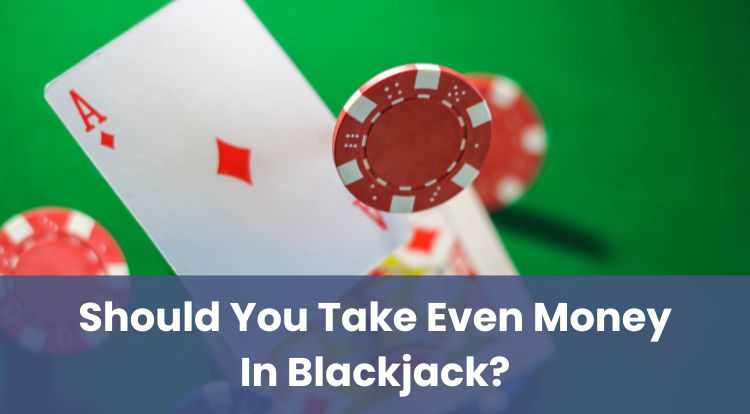
Blackjack is a classic table game that combines both chance and strategy, making it a popular choice amongst many casino players.
One important decision you might come across is whether to take "even money" if you have a blackjack and the dealer's face-up card is an Ace. This option offers a 1:1 payout before the dealer checks for blackjack, but it may not always be the best choice.
This decision can understandably be a little confusing, especially for those that are new to the game. It’s all about understanding the odds and making the decision that might be best for you.
In this blog post, we’ll discuss what taking even money means and help you decide if it’s the right choice for you.
Let's take a closer look at how this works in the game and why the choice is important.
What Is Even Money In Blackjack?
Even money in Blackjack is an option available to players when they're dealt a natural Blackjack, which is getting an Ace and a 10-value card on their first two cards, and the dealer’s face-up card is an Ace.
At this point, the dealer might offer you "even money" on your bet. What this means is that instead of waiting to see if the dealer has a Blackjack as well, you can choose to get paid straight away. You'll receive a 1:1 payout for your Blackjack, ensuring you don’t miss out if the dealer also has a Blackjack.
Normally, a natural Blackjack pays out better than typical wins, usually at 3:2. However, accepting even money means giving up the chance of that higher possible payout in exchange for certainty.
This option is similar to taking insurance, but is offered specifically when you have a Blackjack, providing a guaranteed return regardless of the dealer’s hidden card. While taking even money can feel like a safe bet, it's important to weigh it against the potential higher win you could be giving up.
In addition, Blackjack has many different variations and rules, so the even money option might not always be available. You may want to check the game rules before placing any bets.
What Are The Even Money Blackjack Payouts?
In Blackjack, the concept of even money is tied directly to the payouts you receive when the option is taken. When you opt for even money, you’re agreeing to receive a payout equal to 1:1.
This means you'll be paid the same amount that you initially bet. For example, if your original bet was £10 and you take even money, you’ll receive £10 on top of getting your original bet back, totalling £20.
Under normal circumstances, a natural Blackjack usually pays out at odds of 3:2. This higher payout means if you bet £10, you'd win £15, giving you a total of £25.
However, by taking even money, you're guaranteeing an instant payout at 1:1 and avoiding a potential push (draw) if the dealer also has a Blackjack.
Is Even Money Worth It In Blackjack?
Deciding whether to take even money in Blackjack depends on how you balance the safety of an assured payout against the possibility of a larger win.
When you take even money, you're accepting a guaranteed payout at 1:1. This means you avoid the risk of a "push" if the dealer also has a Blackjack, but you miss out on the typical 3:2 payout for getting a natural Blackjack.
Many seasoned players view taking even money as less favourable in the long run. By declining even money, you’re betting on the chance that the dealer won’t also have a Blackjack, allowing you to enjoy the higher payout if they don't.
Understanding the odds and how often dealers actually have Blackjack can help you decide. While even money might seem appealing for its certainty, it's crucial to consider if trading a possible higher payout for a guaranteed smaller one fits your gaming strategy.
Ultimately, whether even money is worth it comes down to your personal approach to risk and potential reward.
What Is The Best Blackjack Side Bet?
Blackjack side bets offer an extra layer of fun to the game, allowing players to try and win additional payouts based on different possible card combinations. With various side bets available, choosing the best one depends on your preferences and understanding of the game.
One popular side bet is "Perfect Pairs." This bet pays out if your first two cards form a pair, such as two 7s. The potential payouts vary based on whether the pair is mixed, coloured, or a perfect pair (same rank and suit).
Another common side bet is "21+3," which focuses on combining your two cards with the dealer's face-up card to try and form poker-style hands, like three of a kind or a straight.
While side bets can be fun, they typically carry a higher house edge compared to the main game. This means the likelihood of winning these bets is generally lower.
To find the best side bet for you, consider whether you enjoy these extra wagers and are comfortable with the risks involved. Exploring the odds and possible payouts of each side bet can help you decide which one you might enjoy.
Remember, Blackjack involves an element of chance and any winnings can never be guaranteed. Please play responsibly.
*All values (Bet Levels, Maximum Wins etc.) mentioned in relation to these games are subject to change at any time. Game features mentioned may not be available in some jurisdictions.
**The information provided in this blog is intended for educational purposes and should not be construed as betting advice or a guarantee of success. Always gamble responsibly.
